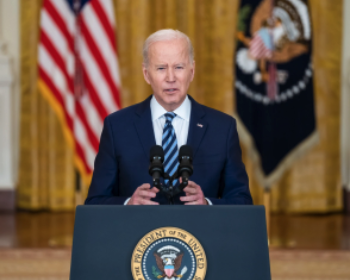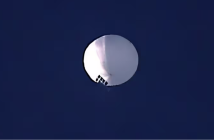Since the beginning of Russia’s war on Ukraine, calls have been growing ever louder for the world to send more arms, more quickly, to Kyiv.
And the more Ukrainian forces have shown they can put what they’ve given to good use to beat back Russian forces, Western nations have increased their aid, culminating in the extraordinary $33 billion promised by President Biden last week.
It’s a staggering sum, larger than most national defense budgets and should definitive end criticism of an administration that has steadily been increasing its support support for Ukraine.
Each NATO country is doing their part, and with each donor conference, nations are becoming ever more public about the what and how many of their donations. Indeed, after a sluggish start, the race is on to show everyone is doing their part.
It’s now vital to keep the effort united, focused on Ukraine’s needs, and not about donor nations’ egos or their domestic political jockeying. Everyone has a role to play, big or small, public or private, classified or not.
All that matters now is ensuring Ukraine’s victory.
It’s time to do more and do it increasingly quietly. Transparency has its place, but so does secrecy. Detailing what’s going to Ukraine only helps Russia better prepare for what’s coming their way, or how depleted NATO’s own stocks are becoming.
Biden and other NATO leaders must better explain to their people why it’s important that we all bear pain over a prolonged period even if it means higher prices at the pump and everywhere else.
Here, Biden has done an admirable job through this crisis of consistently making the moral case for supporting Ukraine and what’s at stake for the future of democracy.
In announcing an new aid package, he made clear that America, and the West were supporting a sovereign, democratic Ukraine against Vladimir Putin’s unjustifiable attack. The Russian dictator alone was responsible for the crisis and alone can stop it. Putin won’t win nor ever control Ukraine.
During his powerful address in Warsaw, Biden underscored the critical importance of the battle between democracies and autocrats who want a world where might makes right and large nations bully smaller ones.
At the end of the address, he said Putin simply cannot remain in power. Critics accused him of advocating regime change, a charge Biden flatly dismissed, clarifying he was expressing his moral outrage and that Putin’s fate was up to the Russian people.
Biden was right to have made the comment and his press team wrong to try to correct him, in the process playing into his opponent’s narrative that the president is doddering.
Hardly. A man with a powerful moral compass and sense of right and wrong, Biden recognizes that as long as Putin is in power, Russia will remain a destructive force, using its armed forces to target, terrorize and butcher civilians, assassinate opponents, and meddle in domestic affairs worldwide.
Defense Secretary Lloyd Austin recently expressed that same sentiment in making clear that a key goal in helping Ukraine was to weaken Russia to reduce its ability to threaten its neighbors.
For nearly two decades, too many of those neighbors turned a blind eye to Russia’s actions and intentions. It is only now, with this second battle for Ukraine, that the West is coming to grips with that reality.
Today, the moral delineation between right and wrong is as stark as it was during the Cold War.
In 1983, Ronald Reagan referred to the Soviet Union as an evil empire, a remark that drew rebukes from Moscow as well as critics at home and aboard.
Fifteen years after the Soviet Union’s collapse, I visited my relatives in Armenia and on a cousin’s bookshelf was a Reagan-Bush campaign button that was among his most cherished possessions. When I asked why, he explained that with that speech, people across the Soviet Union recognized that the leader of the free world understood their reality — that they lived in a truly evil empire.
What matters now is helping Ukraine beat Russia and seeing Putin driven from power. This is not a time for squeamishness or half measures. The Russian dictator, as in every other crisis he’s precipitated, remains convinced he will win because he can withstand more pain than his decadent adversaries.
What’s at stake isn’t merely the independence of Europe’s second largest nation, but the very democratic order implemented after history’s deadliest war that’s maintained peace, stability and prosperity for nearly eight decades.




